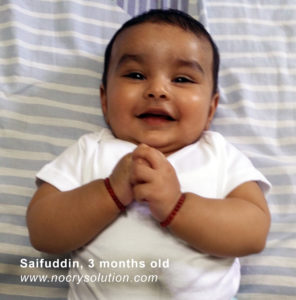The No-Cry Sleep Solution for Newborns
Excerpt
The Newborn’s “Happily Awake Span”

 How do you help your newborn to be happier, sleep better, and be more peaceful? By paying attention to how long she stays awake and making sure she isn’t up too long.
How do you help your newborn to be happier, sleep better, and be more peaceful? By paying attention to how long she stays awake and making sure she isn’t up too long.
The length of time that your baby is awake from one sleep period to the next will have a powerful impact on her temperament and behavior. It will also affect how easily your baby falls asleep and how well she sleeps, so it is a very important consideration.
Newborns shouldn’t stay awake very long
The natural span of awake time is very, very short for a newborn baby and gradually increases over time. Newborns can only stay happily awake for forty-five minutes to an hour or two at the most. At about three months of age some babies still need a nap every hour or two, but some can be awake as long as three hours, if they are routinely sleeping well at night and getting good, long naps. By six months most babies can stay awake for two to three hours. However, most newborns – good sleepers and frequent-wakers alike – do best with short awake spans interspersed with plenty of naps.
I call this the “happily awake span” because your baby can stay awake longer, but typically if she does she’ll be unhappy – fussing and crying and working herself up so much that it’s hard for her to fall asleep, yet hard for her to stay awake. It’s an unpleasant situation for babies and their caregivers, too!
Long awake times can be detrimental to your newborn
Studies show that young babies who typically have long stretches of awake time during the day (more than 3 consecutive hours) appear to have more disjointed sleep and shorter sleep stretches. So make sure your newborn isn’t staying awake past the time when she demonstrates her unique signals of fatigue.
If your baby has been awake beyond this ”happily awake span” you have likely missed some sleepy signals, and your newborn is overtired. An overtired baby will be fussy and find it hard to sleep, yet won’t be able to stay happily awake, either. And the more overtired your baby gets the more he will fuss and cry, to the point of being unable to turn off his frustration long enough to fall asleep, until he eventually wears out. This becomes a pattern that can disrupt sleep, growth and temperament.
Short awake periods = Happier baby
If you want your baby to be peaceful, to cry less and sleep better, keep one eye on your baby and one eye the clock. Perhaps even set your phone to buzz as a reminder that sleep time should be near – then watch for those telltale tired signs. Don’t let your newborn stay awake for too long at a time and sleep will come peacefully for her at the right times.
Excerpted with permission by McGraw-Hill Publishing from The No-Cry Sleep Solution for Newborns by Elizabeth Pantley. (McGraw-Hill, 2016). elizabeth@pantley.com
You are welcome to reprint the article on your website or in your newsletter, provided that you reprint the entire article, including the complete byline with author’s name and book title. Please also send a notice or copy to elizabeth@pantley.com. Thank you.